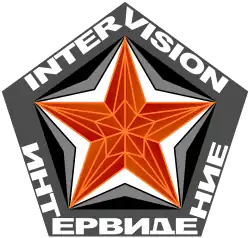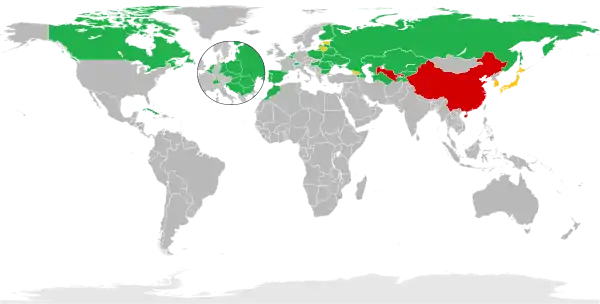Intervision Song Contest
The Intervision Song Contest (ISC) is an international song contest consisting of both Post-Soviet states and members of the Shanghai Cooperation Organisation. It was previously the Eastern Bloc equivalent to the Eurovision Song Contest. Its organiser was the Intervision, the network of Eastern Europe television stations. It took place mostly in the Forest Opera in Sopot, Poland.
| Intervision Song Contest | |
|---|---|
 One of several logos used by the Intervision Network between 1977–1980. | |
| Genre | Song contest |
| No. of episodes | 5 contests |
| Production | |
| Production company | Intervision |
| Distributor | Intervision |
| Release | |
| Original release |
|
| Chronology | |
| Preceded by | Sopot International Song Festival |
| Related shows | Eurovision Song Contest (1956–) |
The ISC was organised between 1977 and 1980. It replaced the Sopot International Song Festival (Sopot ISF) that had been held in Sopot since 1961. In 1981 the ISC/Sopot ISF was cancelled because of the rise of the independent trade union movement, Solidarity, which was judged by other Eastern-bloc countries to be counter-revolutionary.
History
The first Sopot International Song Festival was initiated and organised in 1961 by Władysław Szpilman, assisted by Szymon Zakrzewski from Polish Artists Management (PAGART).[1] The first three editions were held in the Gdańsk Shipyard hall (1961–1963), after which the festival moved to the Forest Opera (Opera Lesna). The main prize has been Amber Nightingale through most of its history.
Between 1977 and 1980 it was replaced by the Intervision Song Contest, which was still held in Sopot. Unlike the Eurovision Song Contest, the Sopot International Music Festival often changed its formulas to pick a winner and offered many different contests for its participants. For example, at the 4th Intervision Song Festival (held in Sopot 20–23 August 1980) two competitions were effective: one for artists representing television companies, the other for those representing record companies. In the first the jury considered the artistic merits of the songs entered; while in the second, it judged the performers' interpretation.[2] The festival has always been open to non-European acts, and countries like Cuba, Dominican Republic, Mongolia, New Zealand, Nigeria, Peru, South Africa and many others have been represented in this event.
The contest lost popularity in Poland and abroad in the 1980s, declining further during the 1990s, and the rather unconvincing organisations by TVP made the authorities of Sopot give the organization of the 2005 Sopot International Song Festival to a private TV channel, TVN. Since 1999, there was no contest. TVP chose to invite well-known artists instead, featuring the likes of Whitney Houston or The Corrs. In 2005, TVN was expected to bring the competition back. In 2006 TVN invited Elton John. The Sopot International Song Festival is usually considered bigger than the Benidorm International Song Festival because of its ability to attract star performers. In 2010 and 2011, the festival did not take place due to renovation of the Forest Opera. Since 2012, it is called Sopot Top Of The Top Festival and is broadcast annually by Polsat. The festival also provided opportunity to listen to international stars. In the past, it featured Charles Aznavour, Boney M, Johnny Cash, and more recently: Chuck Berry, Vanessa Mae, Annie Lennox, Vaya Con Dios, Chris Rea, Tanita Tikaram, La Toya Jackson, Whitney Houston, Kajagoogoo, and Goran Bregovic, Anastacia.
Attempted revival
In 2009, Russian prime minister Vladimir Putin proposed restarting the competition, this time between Russia, China and the Central Asian countries which are mostly members of the Shanghai Cooperation Organisation.[3][4] In May 2014, it was announced that the contest would return after a 34-year hiatus, featuring countries from the Commonwealth of Independent States, the Shanghai Cooperation Organisation and former Soviet Republics.[5]
The contest was scheduled to take place in October 2014 due to Russian anger at the "moral decay of the West", particularly in response to the 2014 Eurovision Song Contest winner Conchita Wurst. Moreover, the revival is seen as part of Vladimir Putin's "broader cultural diplomacy agenda".[6] Despite plans to stage the contest in both 2014 and 2015, the revival of the contest has been postponed.[7][8] Initial plans indicated that the competition would have taken place in Sochi with seven countries having declared their interest to compete: Kazakhstan, Kyrgyzstan, Russia, Tajikistan, Turkmenistan, China and Uzbekistan.[9]
Participation
The contest is open to members of the Commonwealth of Independent States, the Shanghai Co-operation Organisation and former Soviet Republics (including the Baltic states).[9][10][11]
- Table key
- Former – Former countries that have been dissolved.

Winners
| Year | Date | Host City | Winner[12] | Artist(s)[12] | Song[12] | Language |
|---|---|---|---|---|---|---|
| 1977 | 24–27 August | Helena Vondráčková | "Malovaný džbánku" | Czech | ||
| 1978 | 23–26 August | Alla Pugacheva | "Vsyo mogut koroli" (Всё могут короли) | Russian | ||
| 1979 | 22–25 August | Czesław Niemen | "Nim przyjdzie wiosna" | Polish | ||
| 1980 | 20–23 August | Marion Rung | "Hyvästi yö" | Finnish | ||
| No contests held from 1981 to 2007 | ||||||
| 2008 | 28–31 August | Tahmina Niyazova | "Zangi Telefon" (Занги телефон) | Tadjik | ||
| No contests held from 2009 to present | ||||||
Winners by country
| Wins | Country | Years |
|---|---|---|
| 1 | 2008 | |
| 1980 | ||
| 1979 | ||
| 1978 | ||
| 1977 | ||
Winners by language
| Wins | Language | Years |
|---|---|---|
| 1 | English | 2008 |
| Finnish | 1980 | |
| Polish | 1979 | |
| Russian | 1978 | |
| Czech | 1977 | |
See also
- ABU Song Festivals
- Bundesvision Song Contest
- Cân i Gymru
- Caribbean Song Festival
- Eurovision Dance Contest
- Eurovision Song Contest
- Eurovision Young Dancers
- Eurovision Young Musicians
- Junior Eurovision Song Contest
- OGAE
- OGAE Second Chance Contest
- OGAE Video Contest
- OTI Festival
- Pan Celtic Festival
- Sopot International Song Festival
- Turkvision Song Contest
References
- Notes
- "Five Stars Intervision to open in Sochi". UzReport. 20 August 2008. Archived from the original on 14 July 2014. Retrieved 9 June 2014.
- ^ VRT and RTBF alternate responsibilities for the contest.
- References
- Szpilman, Wladyslaw (1 December 2005). "Songs composed by Wladyslaw Szpilman". szpilman.net. Retrieved 30 May 2014.
- Waschko, Roman (6 September 1980). "Finn Singer Triumphant At Sopot Contest". Billboard. Nielsen Business Media. p. 65. Retrieved 5 April 2011.
Two competitions were held at the 4th Intervision Song Festival in Sopot August 20–23, 1980: one for artists representing television companies, the other for those representing record companies. In the first the jury considered the artistic merits of the songs entered; while the performers' interpretation was judged in the second. The outcome was a victory for Finnish singer Marion in the first contest, "Where Is the Love?" taking the Grand Prix. Six year ago, the same artist won Grand Prix at the Sopot International Song Festival. First prize was shared by Czech performer, Marika Gombitová with "Declaration", and Russian Nikolai Gnatiuk for the song "Dance on a Drum".
- Intervision: The Russian proposed song contest with China, Central Asia (Shanghaiist: Shanghai News, Food, Arts & Events)
- Putin mulls Intervision Song Contest (BBC World Service)
- Bartlett, Paul (23 May 2014). "Bearded Lady Spurs Russia to Revive Soviet-Era Song Contest". eurasianet.org. eurasianet. Retrieved 30 May 2014.
- Lee-Adams, Wiliam (25 July 2014). "Following Outrage Over Conchita, Russia Is Reviving Its Own Straight Eurovision". newsweek.com. Newsweek. Retrieved 30 July 2014.
- Granger, Anthony (1 September 2014). "Intervision: 2014 Contest Is Cancelled". Eurovoix. Retrieved 1 September 2014. External link in
|work=(help) - Granger, Anthony. "Intervision: Contest Moved To Autumn 2015". Eurovoix.com. Retrieved 16 April 2015.
- Granger, Anthony (23 May 2014). "Russia: Intervision To Return This October". Eurovoix. Retrieved 26 May 2014.
- Bartlett, Paul (23 May 2014). "Bearded Lady Spurs Russia to Revive Soviet-Era Song Contest". eurasianet.org. Retrieved 30 May 2014.
- Olga, Elenskiy. Rossiя našla zamenu "Evrovideniю" (in Russian). dni.ru. Retrieved 1 June 2014.
- Rosenberg, Steve (14 May 2012). "The Cold War rival to Eurovision". BBC News. Retrieved 31 May 2014.
Intervision winners
External links
![]() Media related to Intervision Song Contest at Wikimedia Commons
Media related to Intervision Song Contest at Wikimedia Commons
- BBC Magazine: The Cold War rival to Eurovision, Steve Rosenberg, 13 May 2012